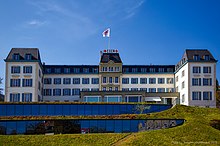Disruptions caused by Russian invasion of Ukraine
Author: Zulqarnain
![]()
In an era when the world seems to be engulfed in multiple challenges stretching from climate change and galloping global inflation to deteriorated global supply markets and crusades waged by the dictators and autocratic leadership across the globe, the Russian invasion of Ukraine has further reinforced them, contributing to create more rifts in the globalization and disruptions in the supply markets. With the blizzard of severe sanctions by America and European countries inflicted upon Russia as soon as the Russian military forayed into the Ukrainian territory, the negative indicators related to global growth and stability took off, leading to further uncertainty and vacillation around the world. The global countries having geopolitical interests in the war might have no qualms about the ongoing casualties and disruptions. Although the weaponry support in providing Ukraine with cavalry, artillery and military training was reinstated during the NATO summit in Vilnius, Lithuania, yet Volodymyr Zelenskyy was denied the inclusion of Ukraine into NATO, which, if included, could have secured the President’s reservations.

Putin’s threats to use nukes for gaining his war objectives have raised concerns as his hawkish policies being evident throughout his tenures from 2008 when troops were sent to Georgia to 2014 when Crimea was annexed, can exert an irreparable damage on the hardly-gained world order based on rule of law. This is what pushed the eastern european countries to put themselves under the tutelage of NATO which is manifested in the recent inclusion of Finland and accession of Sweden after Turkiye’s favour. The eastward expansion of NATO, which–as claimed by Ukraine– initially triggered Russia to invade Ukraine, can definitely be attributed to one of the provocative factors which provided Putin with a ruse to wage a cruel war, wreaking a massive havoc on the global peace.
The recent mutiny by Wagner group led by Yevgeny Prigozhin when Sergei Shoigu, a russian defense minister, ordained the mercenary soldiers to have a direct contract with his ministry, might have further dampened the Russian president. No sooner had the revolt got traction as the Wagner was reported to have captured one of the Russian war headquarters, Rostov-on-Don, than the Western Media began to report the internal rot in the Kremlin, with many commentators making prognosis about how long it would take for the Wagner to oust Putin, but the inflamed fratricide saw a sudden cessation when Belarusian President, Alexander Lukashenko, intervened. The Wagner group might help Russia in neutralizing the Western and European sanctions as it is alleged to be overseeing gold mining in Sudan and operations in other African countries.
Furthermore, some argue that the recent treacherous mutiny has rendered Putin dazed as he has begun to counter the heavy sanctions as has been witnessed in his disapproval regarding the renewal of Black Sea Grain Deal launched in 2022 between US, Turkiye and Russia. This initiative had provided more than 40 countries with 33 million tonnes of grain and food since August last year, reducing global food prices by 25%. The humanitarian crisis ensued as WFP ( World Food Program) would deliver humanitarian aid and economic assistance to the marginalized countries such as starved Somalia, ruined Yemen, and unstable Sudan through provision of grain and food of which more than 80% procured from Ukraine via Black Sea. Such disruptions in the food supply aggravated the food insecurity, especially in developing countries, underlining the devastating pitfalls awaiting the already embattled-world.
On the contrary, some argue that the recent treacherous mutiny has rendered Putin dazed as he has begun to counter the heavy sanctions as has been witnessed in his disapproval regarding the renewal of Black Sea Grain Deal launched in 2022 between US, Turkiye and Russia. This initiative had provided more than 40 countries with 33 million tonnes of grain and food since August last year, reducing global food prices by 25%. The humanitarian crisis ensued as WFP ( World Food Program) would deliver humanitarian aid and economic assistance to the marginalized countries such as starved Somalia, ruined Yemen, and unstable Sudan through provision of grain and food of which more than 80% procured from Ukraine via Black Sea. Such disruptions in the food supply aggravated the food insecurity, especially in developing countries, underlining the devastating pitfalls awaiting the already embattled-world.
